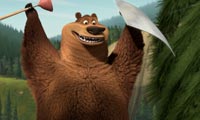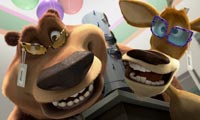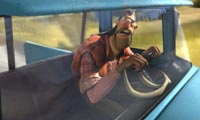Boog (voiced by Martin Lawrence) is a 900-pound grizzly bear happily living in domesticated comfort with Beth, the loving ranger who rescued him as a cub and made him the star of her park wilderness show. Boog enjoys eight square meals a day (not including snacks), and snuggles down with his teddy Dinkelman each night to watch a little TV and drift off to a soft refrain of “Teddy Bear Picnic.”
Elliot (voiced with terrific manic energy by Ashton Kutcher) is a scrawny mule deer who has fallen on hard times. Exiled by his herd for general nerdiness, Elliot comes face to grill with the truck of a ruthless hunter named Shaw (Gary Sinise) and ends up tied to the hood. When Shaw parks the truck in town, Elliot turns out to be less dead than previously thought, and convinces Boog to set him free. Boog’s kindness is rewarded with no end of trouble, as the pesky deer turns out to be both an annoyance and a bad influence. Elliot plies Boog with chocolate and convinces him to partake in a night of sugar-induced mayhem at the local convenience store, fueling speculation that the bear can no longer safely live in captivity. A heart-broken Beth is forced to relocate Boog and Elliot deep into the forest, three days before hunting season begins.

Nature does not, of course, come naturally to the garage-raised bear, who discovers he has no survival skills at all. Desperate for friendship, Elliot promises to lead Boog home, concealing the fact he has no idea where they are. The two hapless animals endlessly circle the same patch of forest, encountering a variety of wacky and mostly-hostile animals. Veteran Scottish actor Billy Connolly is the voice of McSquizzy, a critter who resides in a state of chronic rage and leads his squirrel army of Braveheart-esque warriors in routine acorn attacks on the protagonists. Patrick Warburton (best-known as Seinfeld’s “Puddy”) uses his signature baritone to bring Elliot’s nemesis to life—a blockheaded bully of a buck named Ian. Other memorable characters include a pair of sassy skunks, two shell-shocked ducks, and a porcupine with a gift for being in the wrong place at the wrong time.
There are humans in the woods, too. The wonderful Georgia Engle (enduringly known as Mary Tyler Moore’s Georgette) is the voice of Bobbie, a loquacious senior citizen who, along with her husband and their dachshund, Mr. Weiner, is searching for Big Foot. And of course there are dozens of hunters, none more vicious or sinister than Sinise’s Shaw, who is determined to finish the job on the mule deer who got away and the bear who helped him. It is the threat of the hunters that eventually unites the otherwise factious animals; they, in turn, strike back in a variety of unexpected and amusing ways.

Open Season essentially mines three basic stories, two of which will seem more than a little familiar to viewers who have seen any of the latest spate of CG-animated animal films. The first is the domesticated-animal-out-of-his-element story, featured most recently in Madagascar and The Wild. Open Season mines this premise well, pitting an unsuccessful Boog against salmon skilled in martial arts, and having a lot of fun with his inability to relieve himself in the absence of a hygienic and private toilet. But the sense of déjà vu from the earlier movies is distracting. There are similar difficulties with the second storyline—the odd couple friendship of the hyper and needy but lovable loser (always a small creature) and the good-hearted but often-irritated protagonist (usually something, or someone, big). If reading the last sentence doesn’t get you thinking about Ice Age’s Sid and Manny, or, more so, Shrek’s Donkey and Shrek, trust me, seeing the movie will.
The third plotline is the most original (and most entertaining) element of the movie—the underdog story of the animals turning the tables and hunting the hunters. This material is inventive, exciting and truly funny. Unfortunately, even though this is the part of the movie being promoted in trailers and posters, it constitutes only about the last fifth or sixth of the film.

Despite its overly familiar plot elements and the excessive time it takes getting to its real story, Open Season has a lot going for it. The voice cast is uniformly good. The animation (Sony Pictures’ first foray into CG features) is not remarkably distinct but is highly watchable and sometimes pretty cool, particularly in an extended flood scene. There are some genuinely funny bits, likely to amuse kids and adults alike. But underneath it all is an edge of mean-spiritedness far more problematic than the lack of originality. Sure there is an enduring tradition of hunting in cartoons (Elmer Fudd, anyone?). But a hunter pulling his truck off the road to drive intentionally into the deer caught in his headlights, viscerally rendered in three dimensions, seems to cross a line. Watching scene after scene of Shaw aiming and discharging his rifle, or lunging at one of the film’s animal heroes with a gleaming hunting knife, I started to feel distinctly uncomfortable about my own child’s exposure to the film.
It’s not just the hunting story line that seems to have a crueler edge in Open Season. The warm and fuzzy, loyalty-affirming resolve to Boog and Elliot’s relationship does not, in my opinion, redeem the nasty exchanges mined for laughs along the way. And while I’m as much a fan of absurdist humor as the next gal, the running gag of bunny abuse (rabbits are thrown against a window instead of rocks, used like rags to wipe up messes, and otherwise stomped upon and mistreated) just seems to me to be, well, abusive. Jill Culton, one of the film’s directors, has an impressive resume, having overseen story development in classics like Monsters, Inc. and the Toy Story movies. Those films offered plenty of laughs—some of them more than a little irreverent—without resorting to over-the-top meanness or the denigration of their characters. A little less cruelty and a lot more originality might have put Open Season somewhere in their league.
Talk About It
Discussion starters- The animals in Open Season not only defend themselves against the hunters, they seek and find vengeance. In real life, what is the difference between self-defense and revenge? Is there ever an appropriate time to go from defender to aggressor
- Is hunting for sport moral? How about hunting for food or clothing? Discuss man’s relationship to animals in light of Genesis 1:26.
- Beth’s love and protection of Boog was actually keeping him from living the kind of life for which he was created. Are you holding back anyone you love out of fear or over-protectionism
- Boog resisted leaving his safe and comfortable existence for a more risky life in the wild. Is fear or an unwillingness to leave your comfort zone holding you back from anything you know you should try?
The Family Corner
For parents to considerOpen Season is rated PG for plenty of bodily function humor (animal scat and vomit is on display once or twice) and “brief language” (mostly double entendres to do with male anatomy). The peril faced by the protagonists will likely be too intense for younger or sensitive kids; hunting weaponry is frequently shown in a menacing fashion in order to heighten the action.
Photos © Copyright Sony Pictures Animation
Copyright © 2006 Christianity Today. Click for reprint information.
What Other Critics Are Saying
compiled by Jeffrey Overstreetfrom Film Forum, 10/05/06Is anybody else out there flinching every time the big screen gets a new cartoon full of senselessly jabbering animals? I grew up in a time when an animated Disney feature was an occasional treat and more—a work of art. These days, it seems like there’s a new digitally animated movie about critters every week. They seem so much alike, so disposable, and sometimes rather meaningless. I wonder if it’s starting to annoy the kids as well.
Anyway, Open Season is this week’s talking-animal cartoon, and the celebrities lending their voices to the characters include Martin Lawrence, Ashton Kutcher, and Gary Sinise. It’s about a grizzly bear who is turned loose into the wilderness during hunting season, and how a mule tries to help rescue him from the bullets of a wicked hunter.
Frederica Matthewes-Green (Frederica.com, originally published in The National Review) says, “[T]here wasn’t any element I could honestly say was enjoyable —nothing that sparked wonder. There was lots of skittering and slamming and noise, and the screen often filled up with images that were just plain ugly.”
David DiCerto (Catholic News Service) calls it “an entertaining addition to what has already been a banner year for pixilated pleasures. And while not matching Pixar’s best, it can be enjoyed by all but the very youngest viewers. … [T]he film is a bit thin plotwise and padded with slapstick, but its playful tone and amiable message about friendship make it good family fun.”
Marcus Yoars (Plugged In) says he doesn’t blame the filmmakers for turning in something that seems familiar. “The genre is getting more and more competitive, and often, rising to the top means delivering the most laughs per minute with the slickest animation possible. So by those credentials, this cool-looking kiddie-oriented creation earns solid marks.” But then he finds fault with “potty humor, surprising language issues and a whole lotta played-for-laughs-but-awkwardly-realistic violence.”
Lisa Rice (Crosswalk) says, “Open Season is a fun story with solid character development. … The animation is amazing. … Overall, this skillfully made, high-budget drama/comedy will very likely clean up at the box office as it entertains the masses this fall season.”
Mainstream reviews are mixed.











